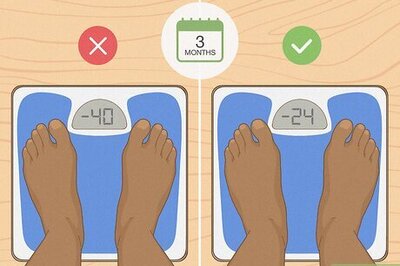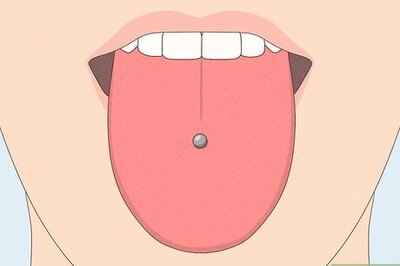
views
X
Research source
Losing a loved one changes your entire life, especially when the loved one was also your best friend. You may feel lost and stuck, uncomfortable making even the most minor of decisions. Know that like a cut heals over time, emotional pain heals eventually, too. This is not to say that you won't have scars, but you can certainly live on. Many people experience great loss and, after a time, still find a way to live rich, full, and meaningful lives — and so can you.
Saying Goodbye

Understand that there are stages you may go through. Although not everyone experiences each of these stages and not everyone experiences stages in the same order, you may experience some combination of denial, anger, resentment, yearning, suffering, sadness, and eventually, acceptance. In addition to possibly not experiencing these in order you may experience these stages repeatedly over the course of your grief journey. Let yourself feel grief and allow yourself to work through these stages. Do not try to mask your emotions and don't try to rush your grieving process.

Fulfill any request that your late partner explicitly made before passing away. If your spouse died suddenly and there were no final requests, explore ideas to honor the memory of your late partner. This may give you a peace of mind, and will ensure that you will not have any mental obstacles in your new life. You can make this a recurring practice, or you may wish to honor your spouse once and then do your best to move on. To honor your spouse you might: Light a candle in their honor. Take flowers to their grave and talk to them. Let them know what's on your mind. Do an activity that you loved to do together, while remembering everything that was great about your spouse.

Know that it will take time before you can begin to feel a sense of normalcy again. Your pain will not just disappear, and it will not heal itself. Be patient with yourself as you work through the process of grief. Grief is a journey that lasts as long as it takes to reconcile all issues pertaining to death, your loved one, yourself, and the good and bad parts of your relationship.

Know the difference between grief and depression. Grief and depression can look very similar, but they are quite different. It is important to know the distinction so that if your grief turns to depression, you can seek help from a therapist. When grieving, you may experience the following: Sadness, despair, mourning, fatigue or low energy, tears, loss of appetite, poor sleep, poor concentration, happy and sad memories, and/or mild feelings of guilt. If depressed, you may experience symptoms of grief, but also the following: feelings of worthlessness or emptiness, helplessness, extreme guilt, suicidal thoughts, loss of interest in pleasurable activities, extreme fatigue, and/or severe weight loss. Pay attention to how good memories of your spouse make you feel. Do warm memories of your spouse give you some comfort or joy? Or do you feel emptiness and loss that even good memories cannot relieve? If you experience the latter, it may be a sign that you are depressed.

Ignore those who tell you that you are not grieving properly. What matters is how you feel you are grieving. The loss of your spouse is between you and your spouse. There is no right or wrong answer for the right amount of time to move on. If someone is telling you that you aren't grieving properly, thank them for their concern and tell them that everyone grieves differently. You may run into someone who thinks that you are either healing "too fast" or who thinks you are healing "too slow" and have become stuck in your grief. If this happens, be sure to keep in mind that while this person's intentions are probably good and that he or she wants to see you healed, it is up for you to decide when you are ready to move on.

Realize that you have choices. There is a time when you need to cry and go through the suffering to get to the other side. There will come a time when you are ready to actively participate in grief work to bring healing to have a new life. Although you had no choice in the loss of your spouse, you can choose how you respond to the situation and how you aim to move on with your life. That said, in the loss of your spouse, you have faced a drastic change. It is best not to make any other drastic changes right away while you are still navigating your loss.

Do not worry that you will forget your spouse. You loved this person enough to be with them until the end. You will remember them. Take comfort in knowing that memories of them will always be in your mind to recall whenever you want to. Let yourself become busy with life; it may do you good in your journey toward emotional healing. Don't think that if you become busy you will forget or that you are disrespecting your spouse. Life requires your attention and hard work. It is normal to be busy with life and it is not a sign that you are forgetting him or her.
Taking Care of Yourself

Care for your physical health. Grief can take a toll on the body. To counteract its effects and ward off depression, be sure to get regular exercise, eat healthy foods, drink plenty of water, take your prescription medications, and get plenty of sleep each night so that you feel rested and alert the next day. You should aim to get 30 minutes of aerobic exercise every day. Try to eat a balanced diet of lean meats, nuts, whole grains, fruits and veggies. Avoid eating too much fat or sugar. Although the amount of water you should drink a day varies depending on many factors, aim to drink around eight glasses of water a day, but don't beat yourself up if you're a bit short of that mark as it isn't a magical number. Aim to get around seven to eight hours a sleep each night, adjust as needed so that you feel rested in the morning.

Become active in your community. One way to help get over a loss is to become closer to other people. One way of increasing your social closeness is by becoming an active participant in your community. Studies in fact show that helping others out can reduce stress and increase feelings of social closeness. To join in, look for flyers around your neighborhood, ask your neighbors, or search the internet for upcoming events you might take part in.

Volunteer when you are ready or have energy. Volunteer your time to a cause or something that you feel strongly about. Helping others can have a wonderful effect on ourselves. In fact, studies show that helping out others make us happier. Take it slow; start out just once a week for an hour and see how it goes for you, then build up from there as you are ready.

Preempt your grief triggers. When things like your spouse's birthday, or some holidays come to pass, you may experience especially strong feelings of sadness. Also be aware that certain locations, smells, or sounds that are associated with your spouse can trigger feelings of sadness. Although this is normal, there are some steps you can take to mitigate the emotional pain you experience. For example, if you and your spouse went shopping together at a particular store, you might consider changing where you get your groceries to avoid being overcome by sadness. Or, you might be flooded by emotional pain when you drive by your spouse's favorite dessert place. You could plan for this by taking a different route to get to where you are going. If you can't take a different route, you might build some time into your day to let yourself experience the painful feelings that might arise in response to this cue. For example, you might leave a few minutes earlier than normal so you can air your grief in the comfort of your vehicle. You may not know what your triggers are until you experience them. Once you figure out something that brings about grief, take note so that you can create a plan for navigating subsequent encounters with this trigger. It’s okay to grieve. "I lost my wife 20 months ago. Grief never goes away, but I promise it lessens with time. If you have just lost a loved one you will be riding the wave for some time, but it will get better. Hang in there." - Bob W. It hurts, a lot. "I lost my husband only 8 weeks ago, and reading that the way I feel is normal helps me. I am so lonely and it physically hurts without him. I miss him so much. Nighttime and first thing in the morning are the worst." - Danielle C. Grief comes and goes. "My wife died of cancer 18 months ago. Some days aren't bad, but other days I feel like she only just left yesterday. On those days—this being one of them—I find it helps to read articles on managing grief and loss. This piece is among the best." - Joshua M. Others are out there that know your pain. "This article helped me realize that my wife's death, although unprepared for and sudden, wasn't unusual, and the anger and guilt I feel in letting her down has been felt by others. You can learn to live with it — I believe in you." - Timothy R. We want to hear from you! Advice from our readers makes our articles better. If you have a story you’d like to share, tell us here.

Consider joining a support group. You may find it comforting to talk to others who have also experience loss. These individuals might be able to provide you with a perspective only gleaned from personal experience with loss. You can search for support groups by going online, asking your grief counselor or therapist, or by looking in your local newspaper.

Talk to a therapist or counselor. Look for someone who specializes in grief counseling if you can. In some cases, experienced counselors or therapists can help you overcome your grief and process the emotions you are dealing with. To find a psychologist near you, try this website.

Do what you've always dreamed of doing. After enough time has passed and you have moved on, allow yourself a major change to provide yourself with some excitement about life again. Now is the time to do it! Be anything you want to be. Become an artist, a pilot, or a scuba diver. Take a ride in a hot air balloon. Most of all, strive to be happy and fulfilled. Your dreams can become a reality and help fill the void in your life. You will meet new people and realize that life can be satisfying and exciting even if you are alone.

Avoid using alcohol or other drugs to cope. Although it may be tempting, if you drink or do other drugs in an attempt to get over your loss, you may just find yourself more anxious and depressed than before. This is because, at least in the case of alcohol (but certainly for at many other drugs, too), the effects of drinking can lead to symptoms of depression and anxiety. Be especially wary of abusing alcohol if you are a man, as there is evidence that men are more likely to drink to cope with loss than are women.

Adopt a pet. Studies show that having a pet is associated with increased well-being, decreased loneliness, and with being less preoccupied with one's thoughts than among non-pet owners. If you don't have the energy to give a great amount of attention to a pet, consider a cat. They make great companions. They are clean and do not have to be walked. They give you love and affection. They give you someone to care for and care about. They will greet you when you come home, and lie on your lap while you watch TV. If you are not a cat person, get a dog, or whatever pet makes you happiest or provides you with a sense of well-being or worth. Understand that the pet will not replace your love, nor is she meant to, but animals can make you smile and listen to you when you feel like talking to fill a lonely day.



















Comments
0 comment